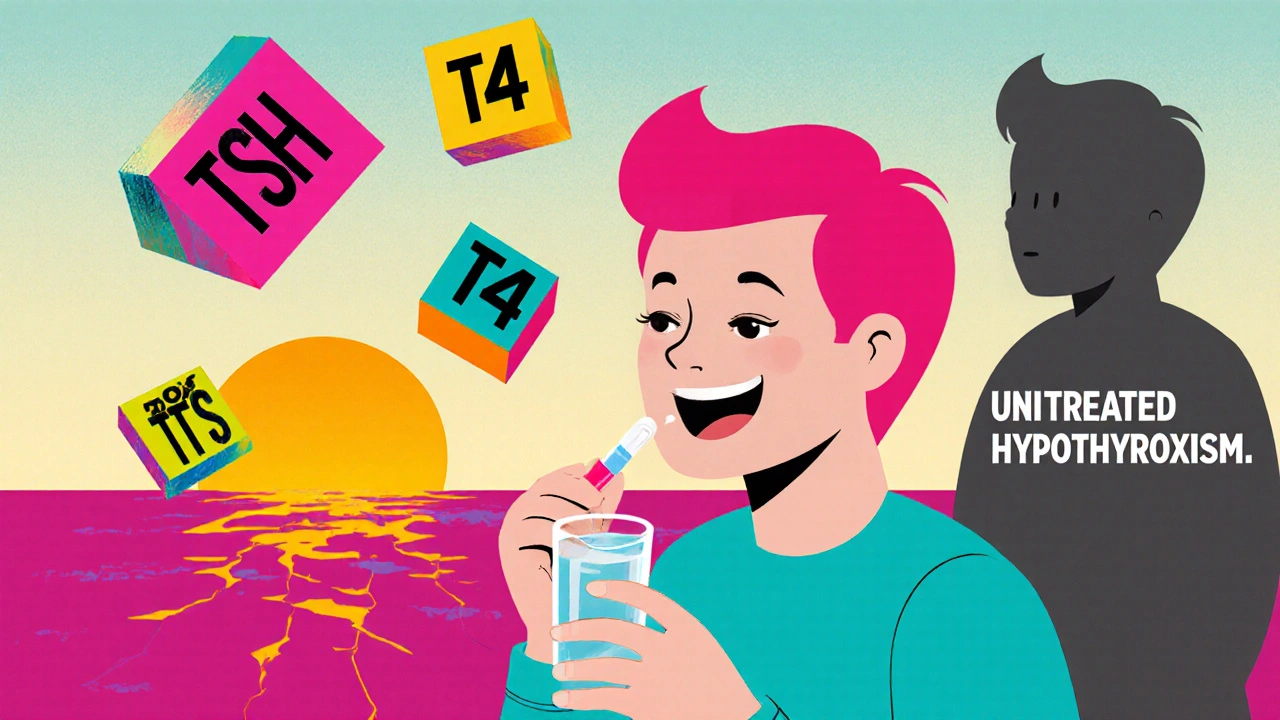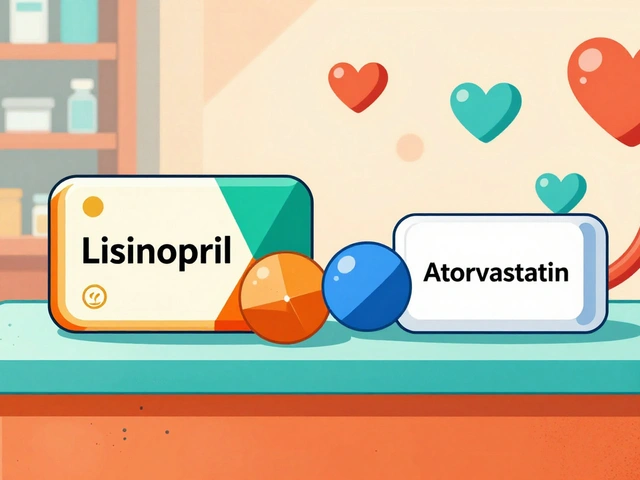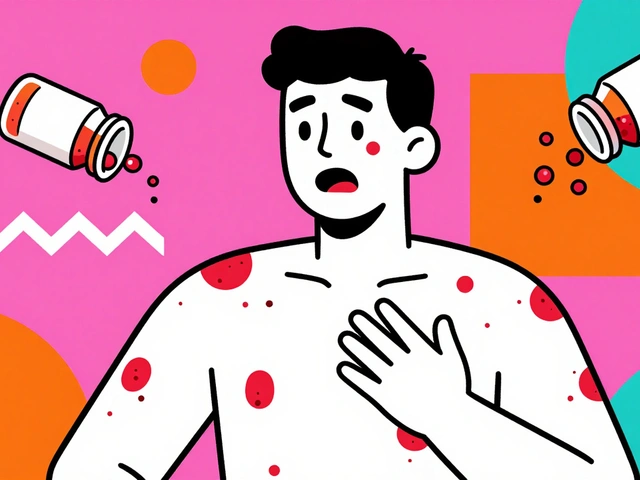When your thyroid slows down, everything slows down. Fatigue that doesn’t go away, weight gain despite eating less, cold hands even in summer - these aren’t just bad days. They could be signs of an underactive thyroid, or hypothyroidism. It’s one of the most common endocrine disorders, especially in women over 60, yet many people live with it for years without knowing. The good news? It’s easy to diagnose and simple to treat - if you know what to look for.
What Exactly Is Hypothyroidism?
Your thyroid is a small butterfly-shaped gland in your neck. It makes two main hormones: T4 (thyroxine) and T3 (triiodothyronine). These hormones control your metabolism - how fast your body uses energy. When your thyroid doesn’t make enough, your body’s processes start to lag. Heart rate drops. Digestion slows. Brain function gets fuzzy. Even your skin and hair change. About 95% of cases are called primary hypothyroidism, meaning the problem starts in the thyroid itself. The other 5% come from the pituitary or hypothalamus - the brain’s control center for hormones. But the real culprit behind most cases? Hashimoto’s thyroiditis. That’s an autoimmune disease where your immune system attacks your thyroid, slowly destroying its ability to function. It’s responsible for 90% of spontaneous hypothyroidism in places like the U.S. and Australia. Other causes include thyroid surgery, radioactive iodine treatment (often used for hyperthyroidism), or radiation therapy for head and neck cancers. Around 20-30% of people who get radiation for cancer develop hypothyroidism within five years. Even pregnancy can trigger it - about 5-10% of women develop postpartum thyroiditis after giving birth.How Do You Know If You Have It?
Symptoms don’t show up all at once. They creep in. You might think you’re just getting older, stressed, or out of shape. But here’s what really happens:- 95% of people feel constant tiredness - not just sleepy, but drained even after a full night’s rest.
- 85% can’t tolerate cold. Even in a warm room, their hands and feet stay icy.
- 75% gain 5-10 kg without changing diet or activity. It’s not just water weight - it’s metabolic slowdown.
- 60% struggle with constipation. Bowel movements become infrequent and hard.
- 50% notice dry skin, brittle nails, and hair thinning. Hair loss often starts at the outer edges of the eyebrows.
How Is It Diagnosed?
Diagnosis starts with a simple blood test. The first check is TSH. If it’s above 4.0 mIU/L, your doctor will check your free T4 (FT4). In true hypothyroidism, TSH is high and FT4 is low - below 0.8 ng/dL. If TSH is high but FT4 is normal, that’s subclinical. For Hashimoto’s, doctors also test for thyroid peroxidase antibodies (TPO). If they’re positive, it confirms an autoimmune cause. These tests are over 98% accurate when done with modern fourth-generation TSH assays. Don’t skip the test just because you feel “fine.” Many people with mild hypothyroidism don’t have dramatic symptoms - but they still have elevated cholesterol, higher risk of heart disease, and long-term damage to nerves and muscles.Levothyroxine: The Standard Treatment
The treatment for almost every case of hypothyroidism is levothyroxine - a synthetic version of T4. It’s safe, effective, and has been used for over 60 years. It works because your body can convert T4 into T3 as needed. The starting dose depends on age and health. For healthy adults under 50, doctors usually begin with 1.6 mcg per kilogram of body weight. That’s about 100-150 mcg daily for most people. But for older adults, especially those with heart conditions, the starting dose is much lower - 25-50 mcg. The goal is to avoid stressing the heart while slowly restoring hormone balance. You take it on an empty stomach, 30-60 minutes before breakfast. Water only. No coffee, no calcium supplements, no iron. These can block absorption by 30-35%. Even eating breakfast too soon can cut absorption in half. Generic levothyroxine costs $4-$30 a month in the U.S. Brand-name Synthroid runs $30-$60. In Australia, it’s covered under the PBS (Pharmaceutical Benefits Scheme), so most patients pay under $7 per script.
How Long Until You Feel Better?
It’s not instant. Levothyroxine takes time to build up in your system. You might notice small improvements in energy after 2-3 weeks. But full symptom relief? That takes 6-8 weeks. That’s why doctors wait 6-8 weeks after a dose change before retesting TSH. The target TSH range for most adults is 0.5-4.5 mIU/L. But it’s not one-size-fits-all. For pregnant women, the target is tighter - under 2.5 mIU/L in the first trimester. For people over 85, a slightly higher TSH (4-6 mIU/L) is often safer to avoid heart strain. Some patients still feel tired even when their TSH is “normal.” That’s not rare. About 25% of people report lingering symptoms. Sometimes, it’s because the dose is still off. Other times, it’s because they’re taking the pill with food, or their absorption is affected by gut issues like celiac disease or H. pylori infection.What Can Go Wrong?
Overtreatment is just as dangerous as undertreatment. If your TSH drops below 0.1 mIU/L, you’re at risk for atrial fibrillation, bone loss, and muscle weakness. About 10-15% of patients end up over-treated - often because they’re taking too much or their dose wasn’t adjusted after weight loss. Undertreatment is even more common. One in five patients never reach optimal levels. Why? Missed doses, inconsistent timing, or not waiting long enough between tests. Some people stop taking it when they feel better - not realizing they need it for life. Combination therapy (levothyroxine + T3) sounds appealing, but studies show no real benefit over levothyroxine alone. Eighty-five percent of clinical trials found no improvement in energy, mood, or weight with T3 added. Major guidelines, including the American Thyroid Association, don’t recommend it for routine use.What Happens If You Don’t Treat It?
Untreated hypothyroidism doesn’t just make you tired. It raises your risk of serious problems:- 25% develop high cholesterol (LDL over 160 mg/dL), increasing heart disease risk by 30%.
- 15% get peripheral neuropathy - numbness, tingling, or pain in hands and feet.
- Women face 20-30% higher infertility rates and 2-3 times greater miscarriage risk.
- The rarest but deadliest complication? Myxedema coma. It’s a life-threatening drop in body temperature, consciousness, and breathing. Even with treatment, 20-50% of cases are fatal.
What About Lifestyle and Diet?
There’s no “thyroid diet” that cures hypothyroidism. But some things help:- Don’t take calcium, iron, or antacids within 4 hours of your pill.
- Avoid soy supplements - they can interfere with absorption.
- Don’t store your medication in the bathroom. Humidity degrades it by 15% per month.
- Consistency matters. Take it at the same time every day. Even small shifts in timing can cause TSH to fluctuate by 20-30%.
What’s Next for Treatment?
Research is moving toward more personalized care. Scientists are studying genetic markers that predict who’s likely to develop Hashimoto’s. Time-release levothyroxine formulations are in late-stage trials - they could make dosing more stable and improve adherence. Some clinics are testing new biomarkers beyond TSH to measure how well thyroid hormones are working in your tissues. But for now, levothyroxine remains the gold standard. Over 98% of endocrinologists agree it will stay first-line through at least 2030.Final Thoughts
Hypothyroidism isn’t a death sentence. It’s not even a life-altering condition - if you catch it and treat it right. Millions of people live full, energetic lives on levothyroxine. The key is consistency: take your pill correctly, get your blood tests done on time, and work with your doctor to find your personal TSH sweet spot. If you’ve been feeling off for months - tired, cold, slow - don’t write it off as stress. Ask for a TSH test. It takes five minutes. It might change everything.Can hypothyroidism go away on its own?
In rare cases, like with postpartum or subacute thyroiditis, thyroid function may return to normal after a few months. But for the vast majority - especially those with Hashimoto’s - hypothyroidism is permanent. Once the thyroid tissue is damaged, it doesn’t regenerate. Lifelong levothyroxine is usually needed.
Is levothyroxine safe long-term?
Yes, when taken at the right dose. Levothyroxine is a synthetic version of a hormone your body already makes. It doesn’t cause addiction or organ damage. The only risks come from taking too much - which can strain the heart or weaken bones - or too little, which leaves symptoms untreated. Regular blood tests keep you in the safe zone.
Why do I still feel tired even though my TSH is normal?
It’s more common than you think. About 25% of patients report persistent symptoms despite normal TSH. Possible reasons: your dose might still be slightly low, your body may not be converting T4 to T3 efficiently, or you could have another condition like low iron, vitamin D deficiency, or sleep apnea. Talk to your doctor about checking ferritin, vitamin D, and free T3 levels - and review your pill-taking habits.
Can I switch from generic to brand-name levothyroxine?
Yes, but only under medical supervision. While generics are bioequivalent, small differences in fillers can affect absorption in sensitive individuals. If you switch brands - even from one generic to another - your doctor should recheck your TSH in 6-8 weeks. Never switch on your own.
Do I need to avoid certain foods?
Not foods - just timing. You can eat soy, cruciferous vegetables (broccoli, kale), and nuts. Just don’t take your pill with them. Wait at least 30-60 minutes after taking levothyroxine before eating. The real culprits are calcium, iron, and coffee - all of which block absorption. Take supplements at night, not in the morning.
How often should I get my TSH tested?
When starting or adjusting your dose, test every 6-8 weeks. Once your TSH is stable for 6-12 months, annual testing is usually enough. But if you’re pregnant, over 65, or have heart disease, your doctor may test more often. Never skip your test just because you feel fine - thyroid needs change with age, weight, and other medications.



November 13, 2025 AT 21:24 PM
Been on levothyroxine for 8 years. Still forget to take it before coffee. Still tired.
November 14, 2025 AT 00:45 AM
I’ve had subclinical for 3 years. My TSH hovers at 5.2. Doctor says ‘wait and see.’ But I’m freezing all the time, my hair’s falling out in clumps, and I can’t remember where I put my keys. Why is ‘wait and see’ the default? Shouldn’t we treat symptoms, not just numbers?
November 15, 2025 AT 03:21 AM
Let’s be clear: TSH alone is a flawed metric. The American Thyroid Association’s ‘normal’ range of 0.5–4.5 is outdated. European guidelines use 0.4–2.5. If your free T3 is low and your reverse T3 is high, you’re hypothyroid regardless of TSH. Yet most doctors won’t test anything beyond TSH. That’s not medicine-it’s laziness.
And don’t get me started on the myth that ‘generic is just as good.’ I switched from Synthroid to a no-name generic and went from feeling fine to suicidal within two months. My TSH didn’t change. My brain did.
November 15, 2025 AT 10:58 AM
So let me get this straight-you’re telling me I have to take a pill every morning, at the same time, on an empty stomach, with water only, and then wait 30 minutes before eating, and if I so much as drink coffee or eat a banana, my whole life collapses? And this is the ‘simple’ treatment? This isn’t medicine. It’s a full-time job with no vacation.
And the worst part? Everyone says ‘just take your pill.’ Like I’m the villain here. Like I’m not trying. Like I’m not exhausted from trying to remember to take a pill that doesn’t even fix how I feel.
November 16, 2025 AT 21:36 PM
For anyone struggling with persistent symptoms despite normal TSH: please, get your ferritin, vitamin D, B12, and free T3 tested. I was told my TSH was ‘fine’ for two years-until I finally pushed for the full panel. My ferritin was 8. Normal is 15–150. Once I corrected that, my energy returned. My brain fog lifted. My hair stopped falling out. Levothyroxine isn’t the whole story. Nutrient deficiencies are the silent co-conspirators.
Also: consistency matters more than perfection. If you miss a dose, don’t double up. Just take it the next day and move on. Stressing about it makes your cortisol spike, which worsens thyroid function. Be kind to yourself.
November 17, 2025 AT 13:25 PM
My mom had hypothyroidism. She used to say ‘I’m not lazy, I’m just slow.’ I didn’t get it until I started feeling it. Now I take my pill every morning and stare at the ceiling for 10 minutes before getting up. It’s not depression. It’s my body trying to reboot. I still cry sometimes over nothing. But now I know why. And that’s half the battle.
To everyone out there feeling invisible: you’re not broken. You’re just under-medicated. Or under-listened to. Or both.
November 18, 2025 AT 16:30 PM
As someone from India, I’ve seen how thyroid issues are grossly underdiagnosed here. Many women are told it’s ‘just stress’ or ‘menopause coming early.’ We don’t have easy access to blood tests in rural areas. Even in cities, doctors often skip TPO antibodies and assume all hypothyroidism is Hashimoto’s. I’ve seen patients on 150 mcg when they only needed 50. Others are on 25 mcg and still exhausted. It’s a systemic failure.
Also, soy milk is everywhere here. People drink it with breakfast. No wonder so many have absorption issues. We need public awareness-not just clinical guidelines.
November 19, 2025 AT 19:39 PM
I was diagnosed at 28. I thought I was just depressed. Turns out my TSH was 12.8. I started levothyroxine. After six weeks, I cried in the grocery store because I could finally lift a bag of rice without feeling like I’d run a marathon. That’s the thing nobody tells you-this isn’t about energy. It’s about dignity. It’s about being able to hold your own life again.
Don’t let anyone tell you you’re exaggerating. Your body is speaking. Listen.
November 21, 2025 AT 08:58 AM
Let me explain why your doctor won’t test free T3: because insurance won’t pay for it. That’s not medical opinion-that’s economics. The system is built to treat TSH, not patients. You want to feel better? You have to be your own advocate. Print out the 2023 ATA guidelines. Bring them in. Demand the tests. If your doctor refuses, find a new one. Your life isn’t a cost-benefit analysis.
And yes, I’ve been there. I’ve been told ‘you’re fine’ while crying in the waiting room.
November 22, 2025 AT 16:46 PM
Levothyroxine is not a cure-it’s a bandage. And we’re treating the symptom, not the cause. Hashimoto’s is an autoimmune fire. We give you T4, but we don’t address the immune dysregulation. We don’t talk about gut permeability, molecular mimicry, or the role of gluten. We don’t mention that 80% of autoimmune patients have SIBO. We don’t ask about trauma, or sleep, or chronic stress. We just hand you a pill and say ‘take this forever.’
And we wonder why people feel worse.
November 23, 2025 AT 04:20 AM
There’s a quiet revolution happening in thyroid care. It’s not in the textbooks. It’s in the Reddit threads, the Facebook groups, the 3 a.m. Google searches. People are connecting the dots: low iron → poor T4-to-T3 conversion → brain fog. Stress → cortisol → suppressed thyroid axis. Gluten → gut leak → autoimmune flare. We’re moving beyond the TSH monoculture.
And yes, levothyroxine saves lives. But healing? That’s a different story. It’s not just a pill. It’s a lifestyle. It’s listening. It’s patience. It’s forgiving yourself for the days you forget the pill-and still showing up.
November 24, 2025 AT 18:00 PM
So you’re telling me I have to take a pill at 6 a.m., wait 30 minutes, avoid soy, avoid calcium, avoid coffee, avoid my morning bagel, and then pray my body converts T4 to T3 properly… and if I don’t, I’m just ‘not trying hard enough’?
Wow. What a system. Brilliant. Let’s just blame the patient.
November 26, 2025 AT 07:50 AM
As an Aussie, I’ve seen the PBS system work-mostly. But here’s the catch: if you’re on levothyroxine, you’re not ‘sick.’ You’re ‘managed.’ So you get zero support. No dietitian. No mental health check. No functional medicine referral. You’re just a number on a script. And if your TSH is ‘normal’? You’re off the radar. That’s not healthcare. That’s administrative triage.
November 27, 2025 AT 16:26 PM
Levothyroxine is a government-approved drug. It’s not some hippie supplement. If you’re not taking it right, it’s your fault. No excuses. No ‘I forgot.’ No ‘I was stressed.’ You want to feel better? Then do the work. Take the pill. Get the test. Stop blaming the system. It’s not broken-it’s your discipline that’s weak.
November 28, 2025 AT 07:41 AM
Just wanted to say: I’ve been on levothyroxine for 15 years. I’m 47. I run marathons. I travel the world. I’m a dad. I have a full-time job. This isn’t a life sentence-it’s a reset button. I used to sleep 12 hours and still be exhausted. Now I wake up at 6 a.m. and feel alive. It’s not magic. It’s science. And it works if you let it.
Take your pill. Get your labs. Don’t give up. You’ve got this. 💪
November 28, 2025 AT 19:12 PM
took my pill yesterday. forgot today. felt like crap. back on it now. its a pain but worth it.
November 29, 2025 AT 23:25 PM
It is of considerable importance to recognize that the pathophysiology of hypothyroidism, particularly in the context of autoimmune etiology, necessitates a multidisciplinary approach to management. The pharmacokinetics of levothyroxine are profoundly influenced by gastrointestinal motility, concomitant medications, and even diurnal circadian rhythms. Furthermore, the notion that a single biomarker-TSH-can serve as the sole arbiter of therapeutic adequacy is, in my professional estimation, an oversimplification that risks iatrogenic harm. The patient’s subjective experience-fatigue, cognitive dysfunction, thermoregulatory intolerance-must be integrated with objective laboratory data. In my clinical practice, I routinely order free T3, reverse T3, and thyroid peroxidase antibody titers, even in ostensibly ‘subclinical’ cases, because the human organism does not function as a linear feedback loop. It is, rather, a dynamic, nonlinear system. To treat it otherwise is to ignore the complexity of biological systems. Moreover, the psychological burden of chronic illness cannot be overstated. Many patients are stigmatized as ‘lazy’ or ‘hypochondriacs’ when, in fact, their endocrine axis has been quietly dysregulated for years. We must move beyond the algorithmic approach to endocrinology and embrace patient-centered, individualized care.
November 30, 2025 AT 08:52 AM
If you’re taking your pill with coffee or eating right after, you’re not just wasting your time-you’re endangering your heart. This isn’t a suggestion. It’s a medical fact. People who do this are statistically more likely to develop atrial fibrillation. If you can’t follow basic instructions, don’t blame the medication. Blame yourself. And stop pretending you’re ‘trying.’ You’re not.
December 1, 2025 AT 17:16 PM
My doctor finally checked my ferritin last year. It was 12. I started iron. Two months later, I could think again. No one ever told me to check that. Just TSH. So much for ‘standard care.’
December 2, 2025 AT 01:11 AM
Thank you for sharing your experience. It underscores precisely the point I was making: the reductionist model of thyroid management fails patients who present with complex, multi-system symptoms. Your ferritin level of 12 ng/mL indicates iron deficiency, which directly impairs the activity of thyroid peroxidase-the enzyme responsible for thyroid hormone synthesis. Even with adequate levothyroxine replacement, insufficient iron renders the hormone ineffective at the cellular level. This is not anecdotal; it is biochemically demonstrable. The fact that this is not routinely screened for speaks volumes about the fragmentation of modern medical education. Perhaps we need to reintegrate systems biology into clinical practice. I applaud your persistence.